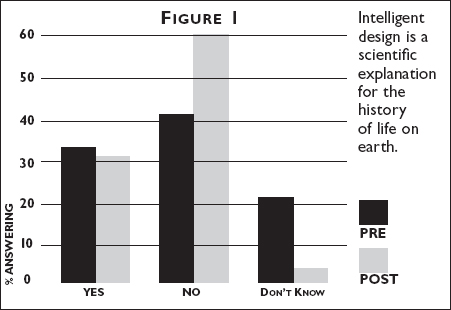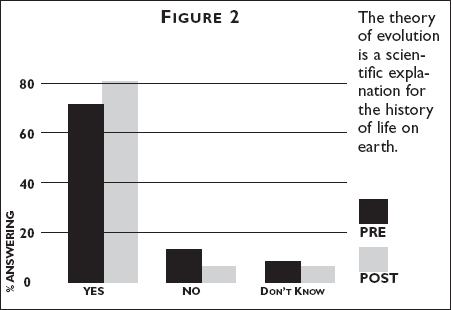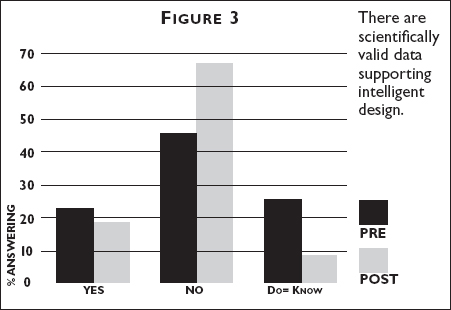On November 13, 2007, most Public Broadcasting Service television stations across the United States aired the NOVA docudrama, Judgment Day: Intelligent Design on Trial. The two-hour program highlighted the controversy surrounding the decision of the Dover, Pennsylvania, school board to require high school biology teachers to read a statement to their classes that "intelligent design" is an alternative explanation for the theory of evolution. The teachers refused, and several parents subsequently filed a federal lawsuit against the school board for its failure to abide by the constitutional separation of church and state (http://www.pbs.org/wgbh/nova/id/about.html). The resulting trial, now often referred to as the "Dover Trial", was meticulously re-enacted in the docudrama, and along with the riveting courtroom testimony, viewers of Judgment Day were treated to a crash course in evolutionary theory and the weaknesses of "intelligent design" explanations. The program won praise from many sources, and on April 2, 2008, it was awarded a Peabody Award for broadcasting excellence (see http://www.peabody.uga.edu/news/pressrelease.php?ID=151).
After viewing the original broadcast ourselves, we decided that Judgment Day offered an educational and entertaining account of the theory of evolution and of a contemporary "evolution war" to which college biology students should be exposed. Therefore,we decided to show the program to students in Centenary College of Louisiana's Biology 101 class (Principles and Methods of Biology) to supplement the section on evolution that students had just completed.
Centenary College of Louisiana is a Methodist-affiliated four-year college in Shreveport, Louisiana. Most of the students enrolled in the college are Louisiana residents, but the college attracts a large percentage of students from Texas and fewer from other states around the country. The college's core curriculum requires all students at the college to take two science courses with laboratories, and Principles and Methods of Biology is the most popular science course available that satisfies core requirements. Because the course is available for both biology majors and nonmajors, it enrolls a mixture of students from academically motivated pre-medical students to students in decidedly nonscience majors, such as music and English, who are simply fulfilling a core requirement. It is a required course for all biology majors, health and exercise science majors, and elementary and secondary education majors.
Five different professors teach six sections of Principles and Methods of Biology, including the two authors of this article. The course design and schedule are collaborative efforts among all five faculty members, and instructors spend the same amount of time on each topic. We introduce evolution as a separate topic approximately two-thirds of the way into the course after students have learned about DNA structure and replication, Mendelian genetics, and meiosis and mitosis. We begin the evolution unit by introducing students to population genetics in the form of the Hardy-Weinberg equilibrium equation, which mathematically demonstrates that characteristics of a population remain constant, or in equilibrium, unless there are extrinsic factors to change them. After having the students discover through calculations that the assumptions of the Hardy-Weinberg equilibrium are not met by sexually reproducing populations, we point out that evolution, as a change in allele frequency in a population over time, is inevitable. Then instructors choose what subtopics of evolution to cover for approximately the next four and a half hours of class time.
Centenary College students enrolled in Principles and Methods of Biology appear closely to reflect national trends in the understanding of evolution. For example, in one section of the course, when asked to rate the statement "Humans evolved from monkeys," 44.4% of the students answered "true". In 2006 the National Science Foundation found that 47% of males and 40% of females correctly answered "true" to the statement "Human beings, as we know them today, developed from earlier species of animals" (http://www.nsf.gov/statistics/seind08/c7/tt0705.htm), implying that 53% of males and 60% of females had an "alternative"understanding of human evolution. One of us (Leuck) has asked students about their high school backgrounds in terms of evolutionary theory since 2000. Approximately 50% of the students polled answer that evolution was not mentioned at all in their high school biology class, or that it was implied but not explicitly taught.
These results are at odds with a teacher survey conducted by Berkman and others (2008), in which only 11% of the high school teachers surveyed stated that they do not cover evolution at all or devote fewer than two hours to it. However, the authors point out that their data support two explanations for differences in teachers' emphasis on evolution: teachers' personal beliefs and the number of college-level science courses they have taken (Berkman and others 2008; see p 37–8 of this issue of RNCSE). In northwest Louisiana, where Centenary College is located, the majority of individuals with a religious affiliation are Southern Baptist (http://www.bestplaces.net/city/Shreveport-Louisiana.aspx), a denomination known for its literal interpretation of the Bible (http://www.sbc.net/bfm/bfm2000.asp#i). Therefore, many teachers in the region may have strong religious beliefs that affect their treatment of evolution in the classrooms, possibly contributing to the lack of knowledge of evolutionary theory typically expressed by Centenary College students in Biology 101.
With the above factors in mind, we decided to offer extra credit points to our student enrolled in Principles and Methods of Biology to attend an evening showing of Judgment Day. We had just completed the unit on evolution, the semester was coming to a close so students were anxious about their grade in the course, and our experience is that students respond favorably to an offer of extra credit in a course, no matter how trivial the number of points (we offered 3 points for attending the program out of a total of 600 points available in the course). We scheduled showings of Judgment Day on two consecutive evenings at two slightly different times to accommodate as many students as possible. Of 140 students enrolled in the course, 95 (68%) attended one of the showings of Judgment Day.
Student Responses to Judgment Day
Prior to the scheduled showings, one of us (Butcher) developed a survey form with six short statements to which students could respond "Yes," "No," or "Don't know". As students walked into the auditorium where Judgment Day was shown, they were handed two copies of the survey statements. Both copies had an identical number on them so we could track the before-and-after responses of individuals who would still remain anonymous. Students filled out one form prior to watching Judgment Day and filled out the second form after watching the program. Pre-surveys were collected before showing the program,and post-survey forms were collected as students left the room after the showing. All data analysis was based on comparing each individual's pre- and post-program answers.
We were surprised that no student at either showing had ever heard of the Dover trial (we asked for a show of hands). We observed that the number of characters introduced in the film and the complex maneuverings prior to and during the trial were confusing to many students who became restless during the program. However,we were actually surprised that the answers to the survey statements indicated that the students had been paying more attention than their behavior suggested during the program.

Depending on the statement, more than one-third of the students who viewed Judgment Day changed at least one answer on the post-program survey from their answers on the pre-program survey. The answers most likely to be changed related to statements targeting students' understanding of "intelligent design". Twenty-four percent of the students changed their answers to Statement 1 (Intelligent design is a scientific explanation for the history of the earth) from "Yes" or "Don't know" to "No" after viewing Judgment Day (Figure 1), and 26% changed their answers to Statement 2 (There are scientifically valid data supporting intelligent design) in the same direction (Figure 2). More students who answered "Don't know" changed their answers than students who answered "Yes," indicating that the program was particularly effective in changing the minds of students who were unsure of "intelligent design"'s role as a scientific explanation (Figure 2). In the end, 70% of the students who watched Judgment Day believed that there are no scientifically valid data supporting "intelligent design".

Although not as dramatic as the results for Statements 1 and 2, the change in answers to Statement 3 (Intelligent design should be taught in the science curriculum of public schools) was also notable. In the pre-program survey 55% of the students answered "Yes" and 45% answered "No" to the statement." Don't know"was not listed as an option to prevent students from avoiding the issue altogether. In the post-program survey the results were reversed, with 39% answering "Yes" and 61% answering "No".

When the number of answer changes to all three statements concerning "intelligent design"were statistically compared to the number of answer changes for all three statements concerning evolution, students changed their answers to the "intelligent design"statements significantly more often than they did their answers to the statements about evolution. These changes may reflect students' unfamiliarity with the premises of "intelligent design" prior to viewing Judgment Day. The program appears to have both convinced students that there is no scientific merit to "intelligent design" and to have educated them about the assumption of the movement.
As mentioned previously, the students watching Judgment Day had just completed the unit on evolution in Principles and Methods of Biology, and their answers to the statements on evolution appeared to reflect the information gained during that unit. There was a slight increase in students answering "Yes" to Statement 4 (The theory of evolution is a scientific explanation for the history of life on earth) from preto post-program survey (76% to 85%) (Figure 3). Similar percentage increases were also observed in Statement 5 (There are scientifically valid data supporting the theory of evolution) from 86% to 92% and in Statement 6 (The theory of evolution should be taught in the science curriculum of public schools) from 91% to 94%. Small percentages of students answered "Don't know" to Statements 4 and 5, but as in the similar statement about "intelligent design" (Statement 3), students were not given the option of answering "Don't know"to Statement 6.
Discussion
Exposing students attending college in Louisiana to evolutionary theory regardless of their majors should be an important goal, considering that the state legislature recently passed, and Governor Bobby Jindal signed, the Louisiana Science Education Act, which allows teachers at the elementary and secondary level to present supplemental material that "promotes critical thinking skills, logical analysis, and open and objective discussion of scientific theories being studied including, but not limited to, evolution, the origins of life, global warming, and human cloning" (http://www.legis.state.la.us/billdata/streamdocument.asp?did=503483). This wording is similar to that suggested by the Discovery Institute, an organization that promotes "a belief in God-given reason and the permanency of human nature" (http://www.discovery.org/aboutFunctions.php). We have discovered that dramatizing evolution in the manner utilized by Judgment Day is a highly effective technique for clarifying the concepts of evolution and counteracting ideas not supported by scientific evidence, such as those expressed by the Discovery Institute.
The lack of high school background in evolution and the short time spent on it in our Biology 101 course were probably partially responsible for the confusion expressed by many students when they answered "Don't know" to the pre-program statements about the validity of "intelligent design". Most introductory college biology courses are constrained in the time spent on evolutionary theory because there are other biological topics that also need to be introduced. To increase high school students' exposure to evolutionary theory prior to their enrolling in a college biology course, a high school biology teacher in Louisiana could request to show his/her students Judgment Day. The program appears to meet the "supplemental instructional materials"criterion of the Louisiana Science Education Act (LSEA). Certainly we would argue that viewing Judgment Day "promotes critical thinking skills, logical analysis, and open and objective discussion of scientific theories" (see http://www.legis.state.la.us/billdata/streamdocument.asp?did=503483) by its thoughtful coverage of the information presented by witness for both the plaintiffs and defendants. Although the LSEA has all the appearances of a stealth creationism document (Stenger 2001), it does not prohibit a high school biology teacher from requesting to supplement the standard textbook with high-quality scientific material such as Judgment Day.
The evidence from these responses indicates that after the evolution/"intelligent design" controversy was presented to Centenary College students in Judgment Day, the students understood that evidence strongly favors an evolutionary explanation of adaptation and speciation. Ideally college students should be taught evolution in an atmosphere that allows them to thoroughly explore its predictive features,as done by Wilson in his Evolution for Everyone course at Binghamton University (Wilson 2005). However, in a more restricted curriculum, showing Judgment Day will both increase students' understanding of evolutionary principles and the nonscientific attempts by organizations such as the Discovery Institute to undermine the teaching of the most comprehensive theory in biology. Adding Judgment Day to classroom units on evolution at both the high school and college level may be particularly important in states like Louisiana that have a history of resistance to scientific explanations of the origin of life on earth. At the very least, our survey shows that Judgment Day did an excellent job of educating college students who truly did not understand the nonscientific premises of "intelligent design".
